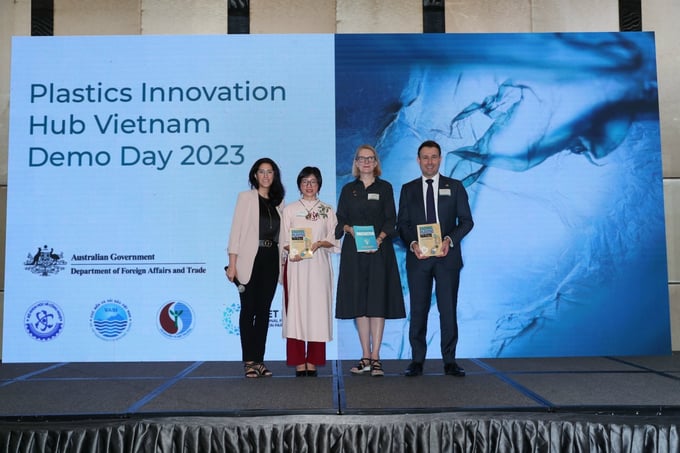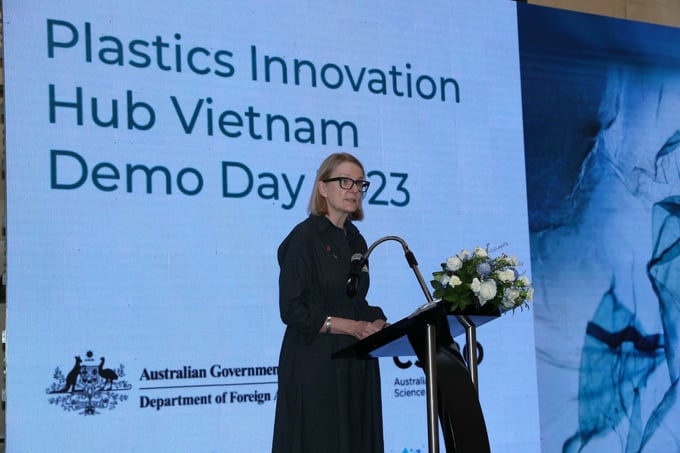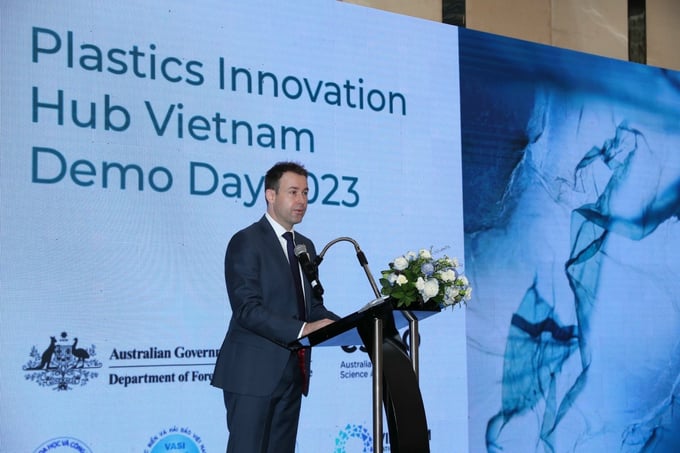May 30, 2025 | 09:37 GMT +7
May 30, 2025 | 09:37 GMT +7
Hotline: 0913.378.918
May 30, 2025 | 09:37 GMT +7
Hotline: 0913.378.918

The event calling for investment and introducing innovative solutions was organized by the Vietnam Plastic Reduction Innovation Connection Center in Ho Chi Minh City.
The event calling for investment and introducing innovative solutions took place in Ho Chi Minh City. According to the Vietnam Plastic Reduction Innovation Network, the most remarkable technology introduced at this event is the method of reducing plastic packaging through the use of straw (Straw Fiber Composite - SFC).
SFC is an innovative project aimed at utilizing straw, an agricultural waste, to develop ultraviolet-degradable films specially designed for food packaging. This project addresses the issue of food exposure to harmful light and the dependency of the food production industry on non-biodegradable plastic packaging, contributing to plastic waste pollution.
By transforming straw into biodegradable films, SFC provides a sustainable alternative to petroleum-based materials, reducing plastic pollution and minimizing agricultural waste. The project targets the food production industry, offering high-efficiency UV-resistant packaging materials and addressing the need for plastic waste reduction.

Ms. Sarah Hooper, Australian Consul General in HCMC delivered the opening speech at the event.
The Vietnam Plastic Reduction Innovation Network, under the Indian Ocean - Pacific Ocean Plastic Innovation Network (IPPIN) and funded by the Australian Government through the Mekong Plastic Action Partnership, is a significant regional program for plastic pollution reduction and climate change mitigation.
The partnership between Australia and Vietnam is an example of the modern partnership's significance in addressing shared challenges at both the national and regional levels.
Sarah Hooper, the Australian Consul General in Ho Chi Minh City, shared, "Both Vietnam and Australia face challenges related to climate change and the environment, with clear impacts on food security and economic prosperity. Collaboration between Australia's scientific agencies and private sector in the region is vital, bringing successful changes and practical solutions that can be replicated."
The Commonwealth Scientific and Industrial Research Organisation (CSIRO), Australia's national science agency, is implementing the IPPIN program. In addition to introducing innovative technologies being developed in the region, the event provides an opportunity to enhance connections in the plastic reduction innovation ecosystem and recognize the entrepreneurial skills of local innovators.
Dr. Kim Wimbush, Senior Advisor of CSIRO in Vietnam, expressed, "CSIRO is committed to building resilient and sustainable ecosystems. Through programs like IPPIN, we strengthen the capacity of the local innovation ecosystem by connecting innovators, researchers, government, and industry to work together to address plastic waste pollution. We believe in the innovative ideas introduced at the event and the ban on most single-use plastic products nationwide by 2031."
In addition to addressing plastic pollution domestically, the EPW delegation has expanded across the Indian Ocean - Pacific Ocean region by establishing IPPIN.
The Vietnam Plastic Reduction Innovation Network is an integral part of IPPIN and is implemented by CSIRO in collaboration with the Ministry of Science and Technology, the Directorate of Sea and Islands, the Ministry of Natural Resources and Environment, and the National Action Plan on Plastic Waste Partnership Program in Vietnam.
According to the World Bank's report, rapid economic growth, urbanization, and changing lifestyles in Vietnam have led to a plastic pollution crisis. An estimated 3.1 million metric tons of plastic waste is discharged on land in Vietnam annually. At least 10 percent of this mismanaged waste leaks into the waterway, making Vietnam one of the top five plastic polluters of the world’s oceans. The volume of leakage could more than double by 2030 under the business-as-usual scenario.

Dr. Kim Wimbush believes in innovative ideas at the event.
The Plastic Pollution Diagnostics report identifies the sources and pathways of plastic pollution in Vietnam. Based on the field surveys, it finds that plastic waste accounts for the majority of waste found in river and coastal sites, accounting for 94 percent of the waste by the total number of items and 71 percent by weight.
The top ten common plastic items account for more than 80 percent of the total plastic waste leaking into waterways. More than 60 percent of plastic items are single-use plastics.
In the National Action Plan for Management of Marine Plastic Litter by 2030, Vietnam targets to cut marine plastic litter by 50 percent by 2025, and by 75 percent by 2030. Some measures have been put in place such as the impending ban on producing and importing of plastic bags for domestic use by 2026 and most single-use plastic products by 2031.
To inform the Government’s efforts in reducing plastic pollution, the World Bank proposes a policy roadmap to reduce the usage of the most common single-use plastic (SUP) items. The top three items are non-degradable plastic bags, expanded polystyrene (EPS) food containers, and plastic straws. Other items are those used in food take-away, catering, and tourism businesses.
This report summarizes a broad range of policies for eliminating SUPs that include restricting the distribution of SUPs, charging fees when SUPs are used, and banning certain SUPs. To avoid disruptive economic impacts, the roadmap recommends reducing SUPs in phases, which begin with restrictions and fees, and then gradually progress toward total bans. It also proposes the coordination mechanism among relevant stakeholders, which is key to the effective implementation of policy interventions.
Translated by Linh Linh

(VAN) The mutual export of agrifood products between the European Union (EU) and the United Kingdom (UK) must occur again without certification, border controls or other red tape. This was agreed at the UK-EU summit.
/2025/05/22/5121-2-173645_677.jpg)
(VAN) NBSAP Tracker identifies strengths and areas for improvement in the National Biodiversity Strategy, based on each region’s priorities and capacities.

(VAN) The draft amendment to the Circular on rice export trading stipulates a periodic reporting regime for rice exporting enterprises.

(VAN) Dong Thap farmers attained an average profit margin of 64% during the summer-autumn 2024 crop (first season), while An Giang and Kien Giang farmers followed with 56% and 54%, respectively.

(VAN) As a doctoral student doing research on renewable energy and electrification at Harvard University, the author shares his musings on electricity, nature, and countryside memories.

(VAN) The decree on Extended Producer Responsibility (EPR) ensures transparent management and disbursement of support funds, avoiding the creation of a “give-and-take” mechanism.

(VAN) Hue City rigorously enforces regulations regarding marine fishing and resource exploitation, with a particular emphasis on the monitoring of fishing vessels to prevent illegal, unreported, and unregulated (IUU) fishing.